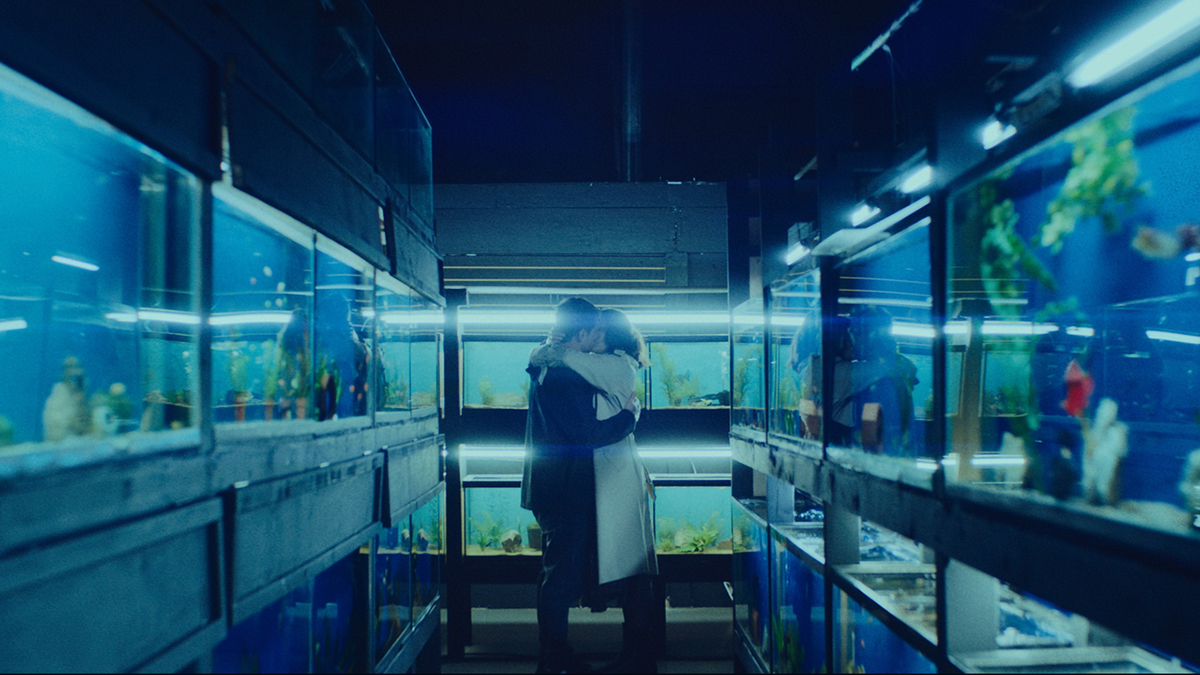Years before COVID-19 became a worldwide reality, Aja Gabel had pandemics on the mind. In 2011, Gabel—a fiction writer who earned her MFA at UVA two years prior—wrote and published “Little Fish,” a devastating short story that tracks a couple’s deterioration as both partners become afflicted with a mysterious, memory-destroying contagion.
The story was an award-winning success—and a decade later, it remains relevant for reasons other than the obvious real-life parallel. On February 5, a film adaptation of “Little Fish,” starring Olivia Cooke and Jack O’Connell as the couple, will be released by IFC.
Gabel has a novel (2018’s The Ensemble) under her belt and another in progress, but she continues to cite “Little Fish” as “my favorite story I’ve ever written.” Although it’s one of her more dystopian works—The Ensemble, conversely, follows four competitive classical musicians and takes inspiration from the author’s musical childhood—Gabel maintains that all of her work is dominated by the question: “What does it mean to love?”
In the case of “Little Fish,” she narrows the question: “Does love have any place in your life if there is no memory or nostalgia?” Gabel’s not convinced she “answered it completely,” but it’s undeniable that the story is an intimate, albeit achingly sad, exploration of love pushed to the limit.
“Little Fish” is also clearly a labor of love, a simultaneously minimalist and jam-packed creation whose gorgeous, lean prose hints at a myriad of revisions and prior iterations. Gabel gives brief glimpses of a world ravaged by the NIA (neuroinflammatory affliction) pandemic, leaving the reader to imagine the wider implications of the tragedy.
Given the pared-down style of “Little Fish,” it’ll be interesting to see how IFC inflates the story to nearly two hours of screen time. Gabel, who has seen the final product, says “it’s not a deviation so much as it is an extrapolation.” The filmmakers took the original story and delved further into each plot point, expanding upon the global implications as well as more deeply detailing the couple’s relationship.
The result is bound to be different than the story—Jude, one half of the couple, seems to have more dialogue in the trailer alone than he does in the original story—but Gabel says she’s more than satisfied with this interpretation of her work. “There are so many details of the world and the couple and the situation…made cinematic. It’s really incredible.”
Gabel had little creative oversight during the actual production of the movie, which is just how she wanted it. “‘Little Fish’…was optioned with a screenwriter already attached,” she says. “That was what was really appealing to me about the deal.” Mattson Tomlin, the film’s screenwriter, is as yet unknown but has several other projects in the works, including 2022’s The Batman, for which he’s credited as a writer.
Little Fish is far from an effects-heavy blockbuster. If the trailer—with its shaky-cam shots and moody instrumental soundtrack—is any indication, the adaptation will fit in with IFC’s other indie films. Gabel says IFC came on last year to distribute the movie, after its actual creation. Financed and made without a distributor or a studio, her story was first optioned in 2016 and officially shot in early 2019. She guesses that Little Fish might’ve caught IFC’s attention in 2020 because of its sudden timeliness, but emphasizes that the movie “definitely was not made or conceived of during any kind of COVID time.”
Now Gabel is making a conscious choice to stay away from pandemic fiction—not wanting, she says, to write about something so relatively recent. Instead, she’s turning to her home state of California, where she currently resides, to write about an issue that’s been raging there for years: climate destruction. Her output on this subject has been nonfiction. “I don’t know what to do about it, but there’s an impulse to document it,” she says. “It feels like the one thing I can do.”
Gabel maintains an air of mystery when discussing another project, her novel-in-progress. Like “Little Fish,” it has “an element of sci-fi in it,” she says, but emphasizes that her initial preoccupations as a writer remain. “It’s still about love, still about memory, still about the nature of how we remain connected to people when things become difficult.”
Much as Gabel continues to be drawn to similar themes in her writing, she’s also drawn to the memory of “where I learned to write.” Virginia, she says, keeps an alluring hold on her from across the country. She attributes this pull to the beautiful geography of the place, and also the people she met while living in Charlottesville. Gabel cites professors Deborah Eisenberg and Christopher Tilghman as enormously influential, saying the latter was the “very first person who really took my work seriously.”
Virginia has been the site of some of the most significant moments of Gabel’s writing career—whether reading “Little Fish” to an audience of students during a 2012 teaching stint at Sweet Briar, presenting The Ensemble to a crowd at New Dominion Bookshop, or her friendships with fellow writers in the MFA program. “My family’s out here, but I always think about coming back to Charlottesville,” says Gabel. “I hope to come back someday. It’s a special place.”
